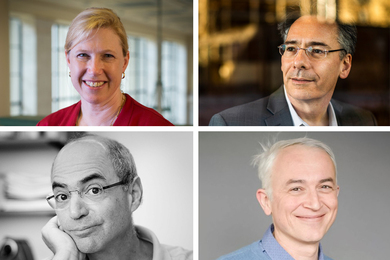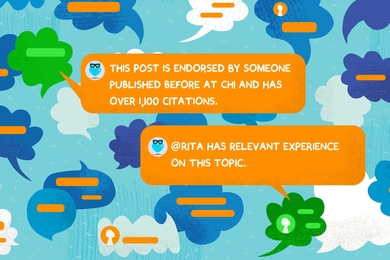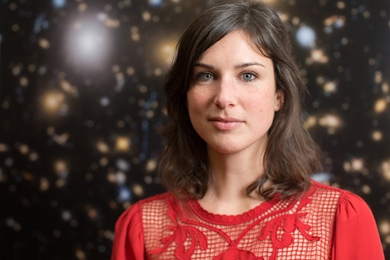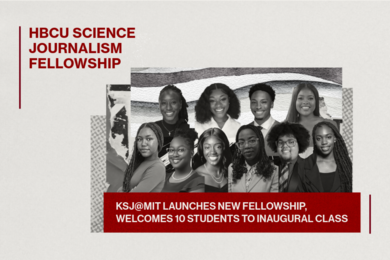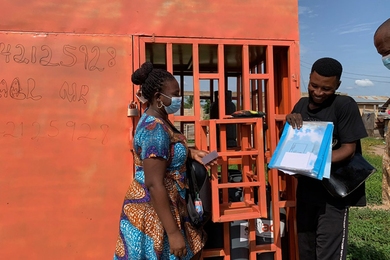Chase: How do you feel about your appointment as Secretary of the Air Force?
Widnall: I'm thrilled.
Chase: Did you expect it?
Widnall: Certainly not initially. But once people started talking about it, it began to look more and more like it would happen. I have had some substantial involvement with the Air Force. I was a member of the Board of Visitors of the Air Force Academy for six years. I've been on several Air Force advisory committees and served on the boards of several nonprofit companies whose primary mission was to do work for the Air Force either through the space program or some other research program, but I've had a lot of involvement with it. Obviously I have great admiration for the Air Force and I feel like a kid with a new toy.
Chase: Antonia Chayes was Undersecretary of the Air Force in the Carter Administration, but you're the first woman secretary?
Widnall: As far as I know, I'm the first woman secretary of any of the services.
Chase: What message do you think your appointment sends?
Widnall: It's bound to be a little controversial, but times are changing.
Chase: What are your major responsibilities as Secretary?
Widnall: The Air Force Secretary is a civilian position with the Air Force Chief of Staff as a [military] counterpart and my role will be to help formulate and state the position of the Air Force, to communicate these to the Secretary of Defense and to participate in the resolutions of those issues, bring them back to the Air Force and implement them.
Chase: What are the policy questions relating to defense that will be major Air Force issues?
Widnall: Procurement issues, for one thing. Buying airplanes. What do you buy, why do you buy it, how many and over what period of time? What do you pay for them? There are issues of training, laboratories and consolidation of labs; questions about bases, like where are they?
Chase: On questions of shrinking and/or reorganizing the Department of Defense, will you have a voice in that?
Widnall: Yes, certainly in regard to the Air Force. I think that's a joint responsibility of the Department of Defense, the Air Force Chief of Staff and the Secretary of the Air Force.
Chase: Do you have an opinion about that now?
Widnall: I think it's clearly necessary to restructure given the changes that we've seen in the world. It may mean an increased emphasis on science and technology and R&D. We may have to be more flexible and the conflicts we may have to plan for may be less predictable, so it's a very challenging time for the military.
Chase: Are there many women in the Air Force? Are they flyers?
Widnall: There are many women, and they are flyers. They don't fly combat planes but they fly everything else. And the Air Force Academy has had women for the last 10 or 15 years.
Chase: Can you tell me a little about your background?
Widnall: I was born in Tacoma, WA. My father had a variety of jobs and he worked for Boeing at several points in his career. He also was a professor at a junior college where he taught mathematics. He actually started out as a rodeo cowboy. My mother was a juvenile probation officer. I can recall urging her to go back to work when I was very young because she had too much energy to stay around the house. I said, "Mother, why don't you just go back to work."I went to a Catholic girls' school. I got to MIT because I entered the local science fair and that brought me to the attention of a local MIT alum and he recruited me.
Chase: When did your curiosity about science show itself?
Widnall: I was good in school. I was good in math and my career goal when I was growing up was to be a high-school math teacher. It wasn't until I got into science courses and especially into lab work and independent projects that I began to think more about being an independent scientist. When I first came to MIT, I thought I was going to be a physicist, along with about half my class. I switched to aeronautics at the end of my freshman year, partly because I really love airplanes and I was from Seattle so it made a lot of sense to think about going home and working for Boeing. That was my career goal.
Chase: You weren't afraid of science then?
Widnall: No.
Chase: Did your parents encourage you?
Widnall: My parents were very encouraging. I think what's neat about science and engineering is that having a career as a woman, you have a sense that at least your qualifications can be measured and the question of whether or not you get the job is not entirely subjective. And at a much earlier stage in your career. If you're an engineer and can do the work of one, you're much more likely to find a position working in industry. And you're much more likely to be treated as an individual than women in traditional women's jobs.
Chase: But there are very few women in, for instance, math at the upper levels.
Widnall: That's true, but I still think that being in a quantitative field where your contributions can be measured is a safer bet.
Chase: How would you describe your career at MIT, first as a junior faculty member, then a professor, then associate provost.
Widnall: I have been at MIT for a very long time and I guess my career has several dimensions, some of which were simultaneous. I had one career as an aeronautical engineer and educator. At any one time I would be teaching undergraduates or graduates, working with students in the lab, and doing research.
Chase: What was your research field?
Widnall: My fundamental field was fluid mechanics, some of it was in turbulence, in noise, and in unsteady flow. It all fit together. But I had a completely separate field at MIT involved in the kinds of global issues universities have to deal with and also in issues involving women. I chaired a number of committees, many of them having some impact on women at MIT such as the admissions committee, which I chaired. And I was chairman of the search committee for the new director of admissions. Clearly what we've been able to accomplish at MIT on admissions, going from some very small number of women students to close to 35 percent in a typical year is a very important accomplishment. I'd like to feel I had some role in that by setting the framework for the new director of admissions.
Chase: Your husband is an engineer. This is a question no one would ever ask a man but how have you managed to keep your marriage going, along with a very high-powered career?
Widnall: It hasn't been easy but my husband's been tremendously supportive and we've always shared our responsibilities, like transportation to the music lessons, soccer, or whatever it was we were both involved in, whatever was happening. The children are grown up now, they're 25 and 28.
Chase: Are either of them in science?
Widnall: Initially not, but my son is going back to school to get a degree in mathematics. He was in East Asian studies. My daughter is a buyer of men's accessories at Saks and loves it.
Chase: You've told me you love airplanes. When did you fall in love with them?
Widnall: As a child, we lived on the approach to McCord Field. These big C-130s were always flying over our house, along with fighter airplanes. The air was always full of planes. And Boeing builds airplanes. So I always thought they were very exciting. It seemed only natural I'd think of going back to work there.
Chase: As associate provost here at MIT, what has been the focus of your attention?
Widnall: I mentioned earlier the number of parallel activities that I was involved in in the development of my career. Another strand of that is activities on the national level. Perhaps because I was a woman I was frequently asked to run for office or be on a committee so I was constantly being exposed to national issues, particularly those involving science and technology. As associate provost, all of that comes together because one of my foci is to look at our relationships with the federal government and with scientific activities on a national scale. I also have a responsibility for scientific integrity.
Chase: You headed MIT's report on scientific integrity.
Widnall: Yes and at the same time I was serving on the National Academy of Science's Committee on Scientific Integrity.
Chase: What is "scientific integrity?"
Widnall: It is the fundamental tenet of science that scientists conduct their work to the best of their ability, that they take their data accurately, openly and honestly. It is in fact the most important quality that underpins science. There has been a certain amount of controversy about false data, misinterpretation of data, various forms of misconduct, and I think that has really shaken the scientific community.
Chase: Are questions of integrity more common in science than in other areas of research as, let's say, history?
Widnall: No, I think it's much less common in science than in any other field of inquiry and I think it's because science is fundamentally self-checking. Any really important advance in science will send hundreds of people into the laboratories to try to replicate the results. In questionable cases, usually 90 percent of the accusations are quickly resolved. However, once you've had six or seven committees look at the problem, you know you're really in trouble and it becomes a case of values.
Chase: If you think it's less common in science than history, why does it get so much more attention?
Widnall: Science feeds much more directly into public safety and public health, and the public, through its representatives in Congress, is the major supporter of scientific research, so people have every right to expect that it will be carried out according to the highest standards.
A version of this article appeared in the August 25, 1993 issue of MIT Tech Talk (Volume 38, Number 3).
